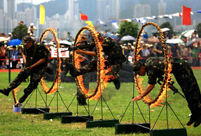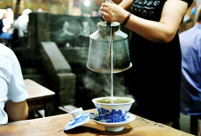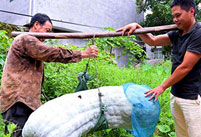 Vintage cars show kicks off in London
Vintage cars show kicks off in London
 Gorgeous scenery in NE China
Gorgeous scenery in NE China
 Picturesque Barkol grassland in Xinjiang
Picturesque Barkol grassland in Xinjiang
 Small Wild Goose Pagoda - A World Cultural Heritage Site along the Silk Road
Small Wild Goose Pagoda - A World Cultural Heritage Site along the Silk Road
 Maritime Silk Road Luxuries of the Han Dynasty
Maritime Silk Road Luxuries of the Han Dynasty
 Ciao! Chinese beauties!
Ciao! Chinese beauties!
 An eye feast: BFA freshmen registration
An eye feast: BFA freshmen registration
 Top 10 most lavish weddings
Top 10 most lavish weddings
 Most amazing chi-pao beauties
Most amazing chi-pao beauties
 Chinese lingerie brand arrives in Las Vegas
Chinese lingerie brand arrives in Las Vegas
BEIJING, Sept. 24 -- China's top panda expert said that panda triplets born in south China in July have an unprecedented 95-percent likelihood of survival, as they are healthy more than 50 days after birth.
Zhang Hemin, director of the China Conservation and Research Center for Giant Pandas, told Xinhua that the triplets have passed the newborn "danger zone."
The pandas were born in the wee hours on July 29 at the Changlong Zoo in the south China city of Guangzhou. They are the first ever set of panda triplets to survive this long.
"Panda twins are rather likely to survive. If we combine artificial insemination with natural mating, the average survival rate for twins can reach 50 percent," Zhang said. "But for triplets, the average was only 1 percent previously."
Zhang said there have been four previous instances of panda triplet births, but in each case, at least one of the triplets died because of physical defects or being underweight.
Now the triplets have reached the same weight as other pandas of the same age.
Their mother, Juxiao, gave birth to the triplets in Guangzhou after being artificially inseminated twice.
Born in 2002 at the Wolong Giant Panda Base in southwest China's Sichuan province, Juxiao gave birth to twins in 2010 before being sent to the zoo in Guangzhou.
Panda breeding is difficult as the animals are reluctant to mate and have low fertility rates. Zhang's team has made great headway in panda breeding, with 208 surviving pandas born at the center so far.
"We try our best to let genetically diversified pandas mate naturally. But in some cases, they don't want to mate. We then turn to artificial insemination."
"That's a double fail-safe to ensure breeding," Zhang said.
 Military training in Hong Kong
Military training in Hong Kong Teahouses in Chongqing: Worship to the leisure lifestyle
Teahouses in Chongqing: Worship to the leisure lifestyle Giant white gourd weighing 87 kilograms appears in SE China
Giant white gourd weighing 87 kilograms appears in SE China Advanced arms help to safeguard China-ASEAN Expo
Advanced arms help to safeguard China-ASEAN Expo Leading director Wang Quan'an detained for 'buying sex'
Leading director Wang Quan'an detained for 'buying sex' Heaven on earth: Dongjiang Lake in Hunan
Heaven on earth: Dongjiang Lake in Hunan Mixed reaction to smartphone sidewalk
Mixed reaction to smartphone sidewalk Amazing aerial photos of China's Xisha Islands
Amazing aerial photos of China's Xisha Islands Top 10 world's highest-paid models 2014
Top 10 world's highest-paid models 2014 Lingerie show at 2014 Miss China
Lingerie show at 2014 Miss China Songstress Li Xianglan dies at 94
Songstress Li Xianglan dies at 94 Police recruiting posters
Police recruiting posters Anshun Daxi- Living fossil of Chinese drama
Anshun Daxi- Living fossil of Chinese drama Urban farmers in China
Urban farmers in China 'Firepower-2014 Weibei'military exercise
'Firepower-2014 Weibei'military exerciseDay|Week|Month